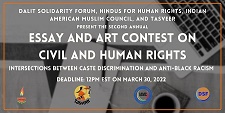We invite South Asian American students* in grades 6-12 to reflect on the intersections between caste discrimination and anti-Black racism.
Across South Asia and the diaspora, persons from oppressed-caste communities such as Dalits continue to face various forms of discrimination, oppression, and societal segregation. In India, caste discrimination is illegal, and affirmative action policies have enabled social, political and economic mobility for some who come from Dalit families. Yet, caste oppression persists and persons belonging to Dalit communities remain socially, economically, and politically marginalized.
Similarly, in the United States, despite the legal successes of the Civil Rights movement and the ongoing Black Lives Matter movement, race-based inequities continue to impact Black communities and other people of color in myriad ways.
From Dr. B.R. Ambedkar to Rev. Dr. Martin Luther King Jr., activists fighting identity-based marginalization, exclusion, and oppression have long seen parallels between the struggles against caste discrimination and anti-Black racism.
Through either an essay or a work of art, we invite students to engage with these intersecting struggles.
Questions that participants can consider include (but are not limited to):
- What are some similarities between caste stratification in South Asia and the diaspora and racial segregation in the US?
- When and how have campaigns to combat these injustices intersected?
- Does your own identity and experiences with caste shape how you think about social justice issues in the US?
- How can social justice movements combat caste and race-based discrimination?
Themes
Intersections Between Caste Discrimination and Anti-Black Racism
Reward
Prize: $1,000 for winners, $500 and $250 for runner-ups
Eligibility
We welcome submissions from students in grades 6-12 who identify as belonging to the South Asian diaspora, defined broadly. Students from all religious backgrounds are welcome. We invite students whose identities intersect in meaningful ways with Afghanistan, Bangladesh, Bhutan, India, the Maldives, Nepal, Pakistan, or Sri Lanka, and the United States. This includes members of the diaspora whose families hail from the Caribbean, Fiji, Singapore or Malaysia, or countries in Africa, for example, as well as students who identify as multi-racial.
South Asian students in grades 6-12 living outside the United States are welcome if they feel connected to or inspired by the U.S. civil rights struggle and contemporary movements against racism and caste oppression.
Key Dates
- March 30: Deadline for submissions
- April 16: Virtual award ceremony
Essay Format
- 700 words minimum; 1,000 words maximum
- Microsoft Word (.docx) document; double-spaced, 12 pt. Times New Roman font
- No personal identification information may be in the body of the essay
- Citations, if any, must be placed in the end, and will not be part of the word count
Art Work Format
- A high-resolution photograph of your artwork.
- 8 1⁄2 x 11 inch or 11 x 17 inch format
How to Participate
-
Pre-Register to indicate your interest in participating in the contest so we can hold a place for you.
-
Submit your final essay or work of art here.
Judging Process
Essay and art submissions will be grouped and judged based on grade level (middle school and high school). Jurors will not be able to see the names of contestants.
Criteria
- Your understanding of the history of struggles against racism and caste oppression
- Your case for connecting social justice movements in South Asia and the United States
- Factual accuracy and critical analysis
- Originality, clarity, and effectiveness of your message.
- Language (grammar, spelling, and composition)
- Any other criteria that the juror groups may agree upon
Ground for Disqualification
All submissions must be original and unique to this competition. Please do not submit work that you have submitted elsewhere. Additionally, providing false information, missing the submission deadline, not complying with the submittal format and word count will disqualify your entry.
Permissions
Contestants may be asked to submit a release allowing the sponsors to publish your essay and/or artwork in print publications and on public websites. In addition, you may be asked to authorize use of your photograph in contest-related promotional materials.



